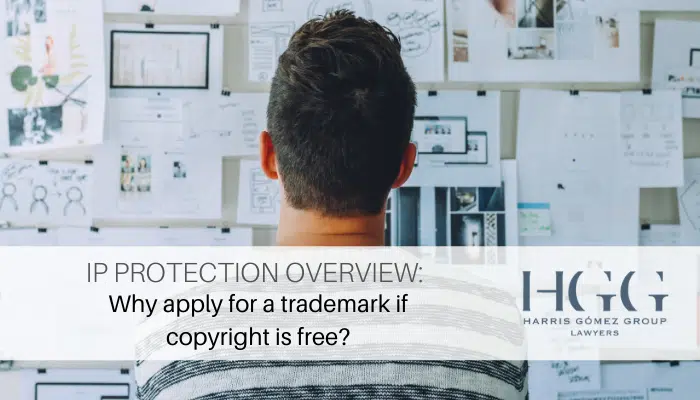We often speak with clients to reinforce the importance of having good practices and mechanisms in place to protect their intellectual property. For many companies and businesses, their IP will often be the most valuable thing that they own and develop, and will often even be the basis of the their entire business – this could be information, methods, or even just the image and brand of the company itself.
Generally speaking, however, there is a lack of understanding as to the different options of intellectual property protection mechanisms. In today’s post, we will talk about some of the misconceptions about the main types of IP protection, and explain the key features and differences, so that businesses are able to determine which is the best option for their circumstances.
So… If copyright is free, why would I need a trademark?
Copyright protects ownership of artistic works, including things like art, theatre, music and literature. It is granted automatically, and gives exclusive rights to the copyright holder, including the right to reproduce or copy the works, distribution rights, and how the work can be used.
On the other hand, trademarks are primarily for protecting brands and logos. It can be thought of as a company’s identity, as it identifies a specific product or service. This can be in the form of a logo, symbol, words, shape, image, or even a scent.
Simply put, copyright and trademarks have different functions that may overlap at times, however, one cannot replace the other. If you are looking to protect your brand and/or logo (as most businesses will be looking to do), you will need a trademark to achieve this.
I’ve decided I need a trademark. How do I register a trademark?
Registering a trademark in Australia involves preparing an application and filing this with IP Australia. The application itself is technical in nature, and in conjunction other actions should be conducted, such as a detailed search to ensure that there are no similar trademarks that may have already been registered or are pending registration. We always recommend having a lawyer experienced in IP law assist with the application to avoid any costly mistakes.
Can I register my copyright?
In Australia, no. There are a few reasons for this. Firstly, it is because a system of registration for trademarks is feasible, where as a similar system for copyright would not really be workable given the volume of new creative material being created on a daily basis. Requiring a form of registration for copyright would not only be impossible to enforce, but it would also end up denying many people rights.
Another reason for the lack of registration for copyright is that, in comparison, trademarks are created for purely business-driven purposes. Trademark registration affords certainty to businesses by having a register of publicly accessible marks for people to be able to review. For the public, confusion is avoided, and for businesses using trademarks to protect their brand, they have a legally binding and enforceable right over their trademark.
For these reasons, copyright is an automatic right granted from the moment the work is set in a tangible form (so, a mere idea cannot be copyrighted). Copyright is widely represented by the © symbol.
What about patents?
Patents are the third main type of IP protection. They are rights granted over inventions or technology, so is applicable for things like machines, industrial processes, manufactured products, chemical compositions or medicines. Patent rights are granted to the inventor, or otherwise to the individual or organization that the inventor gives these rights to. In order to be able to granted a patent right, the invention must be unique and inventive or innovative. Applying for a patent right over an invention is even more technical than applying for a trademark, so it is extremely important that an experienced patent attorney files the application.
How long do each of these types of IP protection last for?
The duration of each of these categories varies as follows:
- Copyright will generally last for 70 years from the year of the author’s death, or 70 years from the year of first publication after the author’s death. In the case of film and sound recordings, it is 70 years from their first publication or from the year of their initial broadcast.
- Trademark registration lasts for 10 years from the initial filing, and can be renewed any amount of times as long as it is being actively used in the course of business.
- A standard patent provides protection and control for up to 20 years from the date of lodging an application.
Conclusion
Your IP is worth protecting. Don’t assume that you are automatically protected by copyright, as unless you have created a creative work, then it will likely only offer very limited forms of protection. While IP laws and protection can seem confusing to people without experience, at the end of the day they exist to protect the property of individuals and businesses. For this reason, it is important that any individual or company first understands the value of their IP, and is subsequently informed of the right form of IP protection for their circumstances.
Harris Gomez Group is an English and Spanish speaking law firm with 25 years experience based in Sydney, with sister offices in Chile and Colombia. We specialise in business, technology and corporations law, property law, and cross-border issues. We assist individuals, entrepreneurs and small to large sized Australian businesses with a variety of issues, including corporations law, intellectual property, property law issues and contract disputes. We are members of both Australian Latin American Business Council (ALABC) and Auscham.
To better understand how we can support you, please contact Harris Gomez at hmg@hgomezgroup.com
Our Sydney office is located at Level 7, 92 Pitt Street, Sydney NSW 2000.







